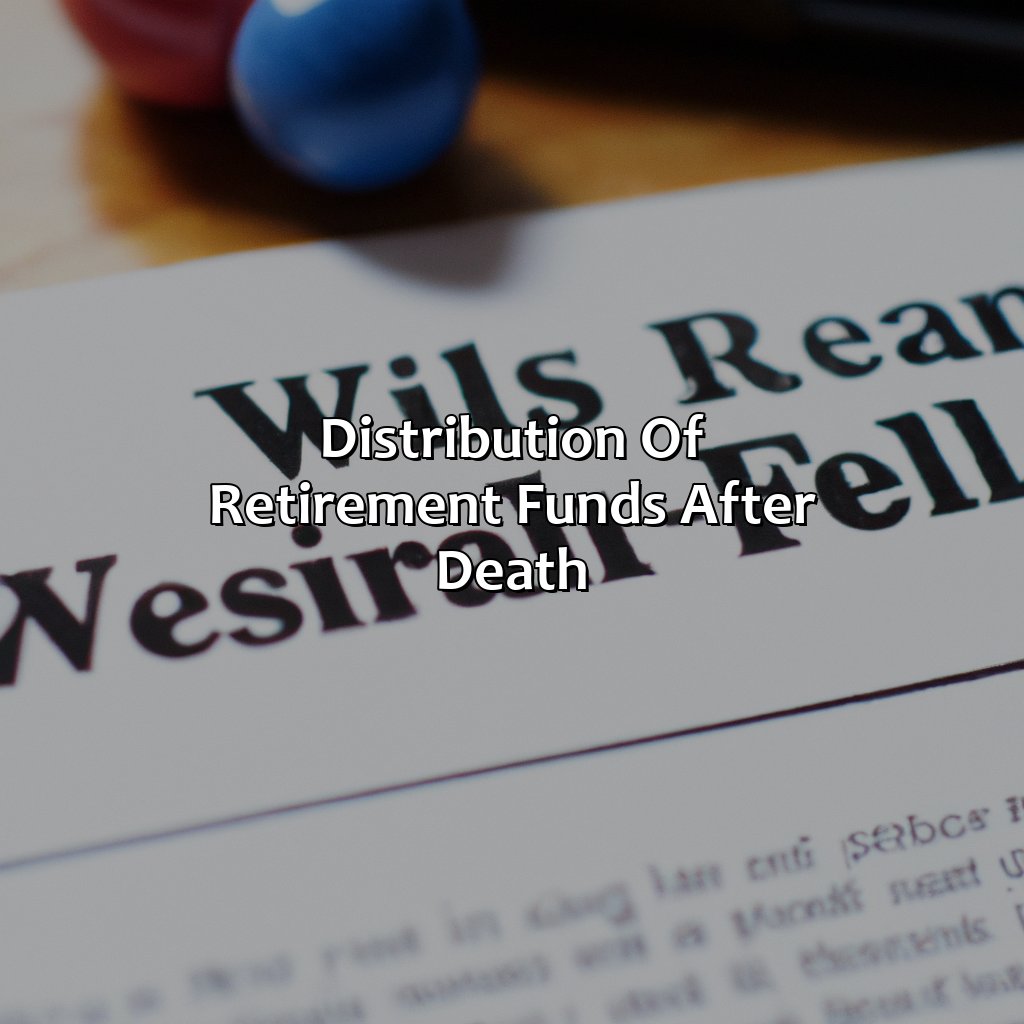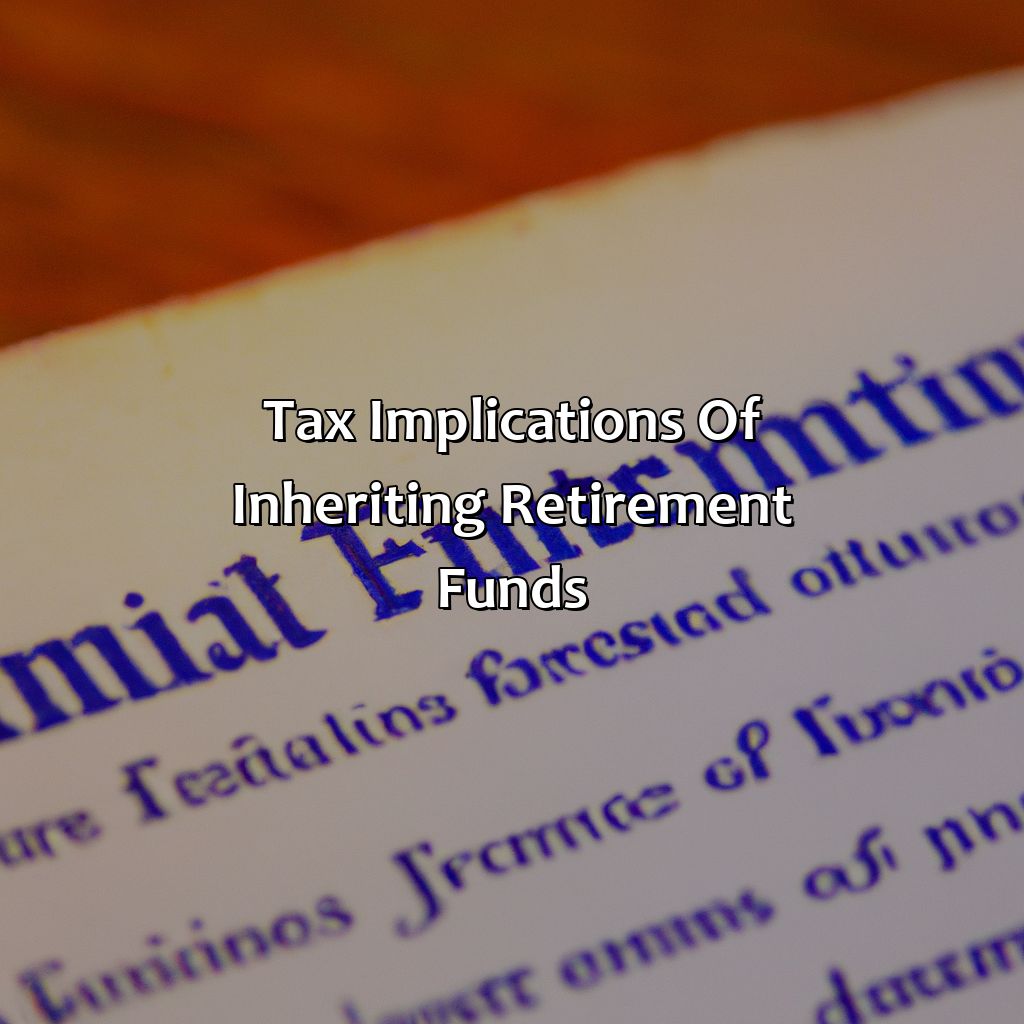What Happens To Your Retirement Money When You Die?
Key Takeaway:
- After a person’s death, their retirement funds are distributed to their beneficiaries, as designated in their retirement plan or will. This process involves following specific procedures and rules, such as the timing of distributions and tax implications.
- The distribution of retirement funds is determined by a person’s beneficiary designations and estate planning documents. These documents should be updated regularly to ensure the correct individuals receive the funds per the person’s wishes.
- The tax implications of inheriting retirement funds depend on the type of retirement account received. Traditional retirement accounts are subject to income tax, while Roth retirement accounts have tax-free withdrawals.
Are you worried about what will happen to your retirement savings when you pass away? You need to understand the process of estate planning to ensure that your financial legacy is secure. Discover what will happen to your retirement money when you die and evaluate the best options for you.
Distribution of Retirement Funds after Death
Retirement Funds Distribution After Death
When an individual passes away, their retirement funds are distributed according to their designated beneficiaries. These beneficiaries are specified in the individual’s will or in the retirement plan documents. The beneficiaries can be family members, friends, or even charitable organizations. The distribution of the funds can be in the form of a lump sum or in regular payments over time.
It is important to note that the distribution of retirement funds after death can be subject to taxes. The taxes vary depending on various factors such as the type of account, value of the account, and the age of the deceased individual. Additionally, if the individual did not specify a beneficiary, the funds may go into probate and could be subject to legal fees.
A unique aspect to consider is that retirement funds are typically protected from creditors in the event of bankruptcy. However, after an individual’s death, creditors may be able to make a claim on the funds before they are distributed to the beneficiaries.
One true history example highlights the importance of regularly reviewing and updating beneficiary designations. In a high-profile case, a man’s ex-wife was named as the beneficiary of his retirement funds before they divorced. Upon his death, his current wife and children were left with nothing. This case emphasizes the importance of ensuring beneficiary designations are up to date to avoid unintended consequences.

Image credits: retiregenz.com by Adam Duncun
How Is the Distribution Determined?
To know how your retirement savings will be shared after your death, think about your beneficiary designations and estate planning. This section titled “How Is the Distribution Determined?” with the sub-sections “Beneficiary Designations” and “Estate Planning” will help you decide how your retirement funds will be distributed as per your wishes and plans.

Image credits: retiregenz.com by Joel Arnold
Beneficiary Designations
When you specify your chosen recipient for your retirement funds, it is called ‘naming a beneficiary.’ Here are six points to understand beneficiary designations:
- Beneficiary designations override the will.
- Only those named as beneficiaries can receive retirement savings.
- Keep your beneficiary designation updated.
- You can name multiple beneficiaries and assign percentages of the funds to each.
- Consult with a financial advisor before making decisions to avoid tax implications.
- Irrevocable beneficiaries require the consent of all parties when changing details.
It is important to note that if there is no living beneficiary or named contingent beneficiary at the time of death, it will be up to the retirement plan’s rules and state laws where you live. Pro tip: ensure to regularly update your beneficiary designation as personal circumstances may change over time. When it comes to estate planning, it’s better to be prepared with a will than to leave your loved ones fighting over who gets your collection of ceramic garden gnomes.
Estate Planning
Estate distribution planning involves creating a comprehensive strategy to transfer your assets to heirs after you pass away. This includes managing tax implications, creating trusts or wills, and assigning beneficiaries. It allows for an efficient transfer of wealth without unnecessary probate costs and legal battles.
With the right plan in place, your assets can be managed according to your wishes even after you are no longer able to do so. Trusts allow you to protect assets from creditors and provide for minor children. Assigning beneficiaries ensures that specific property goes directly to designated individuals.
However, it is important to keep your estate plans up-to-date to reflect major life changes such as marriage, divorce or having children. Neglecting these updates can result in unintended consequences and cause confusion among loved ones.
Don’t delay estate planning any longer. Ensure that your legacy is secure by employing a qualified estate planner today.
“Death and taxes may be inevitable, but inheriting retirement funds means you can enjoy both at the same time.”
Tax Implications of Inheriting Retirement Funds
To grasp taxes when it comes to obtaining retirement funds with traditional and Roth accounts, you must understand their distinctions. Inheriting these accounts is bound by certain regulations and taxes that could alter your inheritance. Let’s discuss how you can manage the tax considerations of these kinds of retirements account inheritances.

Image credits: retiregenz.com by Adam Woodhock
Traditional Retirement Accounts
Retirement Funds are a crucial aspect of financial planning. It is essential to understand their implications when they are passed down to the inheritors. These accounts have tax implications that need consideration since the inherited retirement money may be subjected to income tax.
These traditional retirement accounts have been a popular option for many over the years, offering various tax benefits to the account holders. Unfortunately, upon death, an individual’s retirement funds are subject to taxation if not properly planned for in advance. It is essential to note that taxes imposed on inheriting these accounts depend on several factors such as age and relationship of the beneficiary.
It is interesting to note that changes were made on January 1st, 2020, regarding inherited IRA distribution rules which impacted non-spousal beneficiaries significantly. This implies that non-spouse beneficiaries who inherit Retirement Funds now face new distribution timelines extending up to ten years instead of stretching over an extended period.
Reports indicate that in 2017, approximately $2 trillion was being held in Inherited Individual Retirement Accounts (IRAs) across America. Factors such as high net worth holders and older demographics with substantial assets make it imperative for individuals with such accounts to plan for their transfer carefully and weigh all related implications thoroughly.
Roth Retirement Accounts
One type of retirement account is the Roth account, which allows contributions to be taxed before they are invested. Inheriting a Roth Retirement Account means that the funds pass to beneficiaries without ever being subject to income taxes. Unlike traditional IRA accounts, which are taxed when distributed, Roth account distributions are generally tax-free.
Roth Retirement Accounts can offer unique benefits for estate planning and long-term wealth management. Since distributions from Roth accounts aren’t required until after the owner passes away, contributing to them can help build tax-free income streams for future generations. Additionally, since inherited Roth funds are tax-free, beneficiaries could benefit from a valuable source of untaxed passive income.
It’s important to note that inheriting a Roth account may also entail complex estate planning considerations. For example, depending on the size of the account and individual circumstances surrounding its inheritance, it may make sense for heirs to disclaim some or all of the funds. Seeking professional financial advice is recommended in such cases.
To maximize the benefits of inheriting a Roth account, beneficiaries may wish to consider some suggestions:
- Consider taking minimum required distributions only in certain years so as not to push yourself into higher tax brackets.
- Keep careful records of any expenses related to managing or maintaining inherited assets.
- Be aware of any changes in how federal or state taxes treat inherited accounts over time and adjust strategies accordingly.
By following these suggestions and considering the unique advantages offered by Roth Retirement Accounts, beneficiaries can maximize their inheritances while minimizing their tax liabilities and other complications related to estate planning.
Some Facts About What Happens to Your Retirement Money When You Die:
- ✅ Your retirement money may be passed on to your spouse or designated beneficiary. (Source: Investopedia)
- ✅ If you have not designated a beneficiary, your retirement funds may be subject to probate. (Source: The Balance)
- ✅ If you pass away before the required minimum distribution age, your beneficiaries may be able to stretch out distributions over their own lifetimes. (Source: Forbes)
- ✅ Your retirement account may be subject to estate taxes, which can impact how much your beneficiaries receive. (Source: Fidelity)
- ✅ It is important to review and update your beneficiary designations regularly to ensure your retirement funds go where you want them to. (Source: NerdWallet)
FAQs about What Happens To Your Retirement Money When You Die?
What happens to your retirement money when you die?
When you pass away, your retirement savings will likely be distributed to your beneficiaries or heirs through your estate. However, the distribution process can vary depending on the type of retirement account you have and whether you have set up a beneficiary designation.
Do I need to designate a beneficiary for my retirement accounts?
Yes, it is important to designate a beneficiary for your retirement accounts to ensure that your savings are distributed according to your wishes. If you do not have a beneficiary designated, your savings may be subject to probate and distributed according to state law, which may not align with your intentions.
What happens if I do not have any living beneficiaries at the time of my death?
If you do not have any living beneficiaries at the time of your death, your retirement savings will likely be distributed to your estate and subject to probate. This can result in delays and additional expenses, as well as the potential for the savings to be distributed in a way that you did not intend.
Can I specify how my retirement savings should be distributed after my death?
Yes, you can specify how you would like your retirement savings to be distributed after your death by setting up a beneficiary designation for each account. You can also update your beneficiary designations at any time to reflect changes in your life circumstances or wishes.
What are the tax implications of distributing retirement savings after death?
The tax implications of distributing retirement savings after death can vary depending on the type of account, the beneficiary designation, and other factors. In general, beneficiaries may be required to pay income taxes on distributions from traditional retirement accounts, while distributions from Roth accounts may be tax-free. It is important to consult with a financial advisor or tax professional to understand the tax implications in your specific situation.
Can I avoid probate for my retirement savings?
Yes, you can potentially avoid probate for your retirement savings by setting up a living trust and naming the trust as the beneficiary of your retirement accounts. This allows your savings to be distributed to the beneficiaries of the trust outside of probate, potentially reducing delays and expenses. It is important to consult with an estate planning attorney to determine if a living trust is appropriate for your situation.




